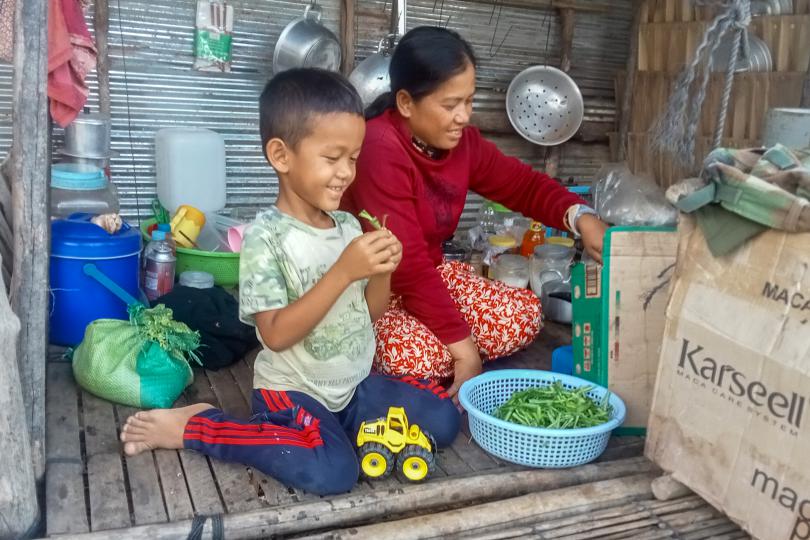A mother acknowledges using violence for parenting is a false assumption

Rith Chheang, a 37-year-old mother, had a broad smile when she spoke about the changes in her childrearing attitude, resulting in improved interaction between her and her children.
Ms. Chheang is a small family grocery store owner, and her husband, Phorn Phearum, is a fisherman and farmer. Both live in Chheu Teal Knong Village, Phlov Tuk Commune, Kampong Chhnang’s Kampong Leng District, with a daughter, Rum Panha, and a son, Rum Phearoth.
According to Ms. Chheang, the 11-year-old Panha is currently studying in grade 5. Unfortunately, the 7-year-old Phearoth could not move to a higher grade and has been studying at preschool for three years.
“Back then, I was furious at Phearoth. I usually cursed, shouted, and hit him with a wooden stick. I did it almost every day when I sent him to school. It was also because he could not read or write like other children,” she said. “There was a time when I sent him to grade one room, and he cried and asked to return to preschool.”
Ms. Chheang, who had only completed grade three in primary school, said she had taught her son aggressively, falsely assuming that it would help her son stay focused and learn faster, but it did not. Instead, she slowly became reckless with his study.
“I like to study at preschool, and I can meet friends, and we usually sing together,” Phearoth said quietly.
Chheu Teal Knong preschool and primary school, where Phearoth and his sister are studying, were among the target schools supported by the European Union’s Generating Resilient Environments and Promotion Socio Development of the East Tonle Sap Lack (GREEN) project with funding from Norton Rose Fulbright.
In May and June 2022, Ms. Chheang was invited by Phearoth’s teacher, Ms. Chhorn Phaleak, to attend the monthly parental meeting and the positive parenting session where she was taught how to communicate better in raising small children at home.
Ms. Chheang said she has joined six meetings over the past months and learned about early childhood development programmes, communication with small children, and ways to teach children to read and write, which are primary education that all children should be equipped with before they enter primary school.
“I now use soft and sweet words with my son while teaching him at home. My daughter also spends time teaching his younger brother, and we play and have fun together,” she said. “Because it has become a habit, I honestly still use harsh words with my son sometimes but less than before.”
Phearoth’s teacher, Ms. Chhorn Phalleak, said she observed the changes Ms. Chheang had recently made, adding that Ms. Chheang became friendlier when she dropped her son off at preschool and was proactive during the positive parenting sessions.
“I think she has now learned what positive parenting is and started to act accordingly,” Ms. Phalleak said. “She has slowly changed her attitude, from what I noticed.”





